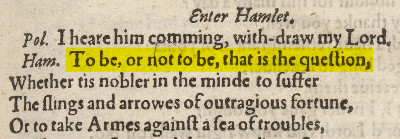Quoth Peter Bleackley on Twitter:
Indeed, besides Peter’s joke (that took me a while to recognize …), it would be interesting to compare how various languages with a zero copula translate Shakespeare’s probably most famous line (yellow marking mine):

Since Ayeri is a language with a zero copula – that is, the copula, “be,” does not have a phonetic realization – I was wondering how to translate this quotation. However, I would rather expect from context that the way “be” is used in English here refers to existence: the verb “be” is used as a full, content verb rather than the copula as a function. That is, the way Hamlet uses “be” does not suggest that he is assigning a quality to the subject, as in “The king is dead,” or “I am suicidal.”
In spite of possessing a zero copula, Ayeri nonetheless has an overt verb for “be” in the meaning of ‘exist’: yoma-. However, what Ayeri still lacks is a proper infinitive – the only non-finite form there is, is the participle, but you can’t usually use this as a nouny standalone thing as in English.[1. I’m not sure if there’s something in the Grammar about this. If the Grammar allows participles to stand on their own, my usage has changed meanwhile.] A possible solution to this problem is to use the noun, yomān ‘existence’. This raises another question, though: how do you negate that, that is, what do you get for ‘inexistence’? Searching the dictionary for nouns in in-/ir-/il-, dis-, un- doesn’t reveal any obviously negated nouns.[1. A possible candidate would be tenyan ‘death’, though, since ‘life’ is ten‘; -ya is one of the allomorphs of -arya (cf. below). Ayeri quite loves -ya as a morpheme!]
Besides verbs, the only other category that can be negated are adjectives, which are rather noun-like in Ayeri. Adjectives may be negated by -oy and -arya (which has a variety of allomorphs), and since the negation of ‘existence’ we need here is categorical rather than transitory, I would choose -arya. This results in yomāryān as a possible negation:
exist -NEG -NMLZ[/gloss]
‘inexistence’
On the other hand, since yomān is already derived from a verb and verbs get negated with -oy, another possible derivation could be yomoyan:[1. With the transitory adjective negation -oy, the outcome would indeed have been the same, so it really doesn’t matter here.]
exist -NEG -NMLZ[/gloss]
‘inexistence’
I think the latter case is more succinct, so I’d translate the famous line from Hamlet as:
[gloss]Yomān soyang yomoyan – ada-reng prantān-ley
existence or inexistence – that-A.INAN question-P.INAN[/gloss]
‘Existence or inexistence, that is the question.’
Note that in the first half of the sentence, the nouns are not case marked. I chose not to mark them for case since as far as I can tell, they do not fit into the case frame of any verb here, besides the fact that the sentence above does not include any overt verb.
Of course, using less enigmatic language while it still being a bit of a pun, I could also simply translate:
[gloss]Ten soyang tenyan …
Life or death …[/gloss]
‘Life or death – that is the question.’
But that would’ve been boring.
- Shakespeare, William. The Tragicall Historie of Hamlet, Prince of Denmarke. London, 1604. [27.] The Tragedy of Hamlet Prince of Denmarke: An Electronic Edition. The Shakespeare Quartos Archive. Shakespeare Quartos Archive. Mar. 2009. Web. 8 May 2013. ‹http://www.quartos.org›. (The image the presented excerpt is taken from was published under CC-BY-NC; original image cropped and yellow marking added.)
- David J. Peterson informs that the “[u]sual route is ‘to live or not to live’.” Phrasing it exactly that way doesn’t work in Ayeri either, though.